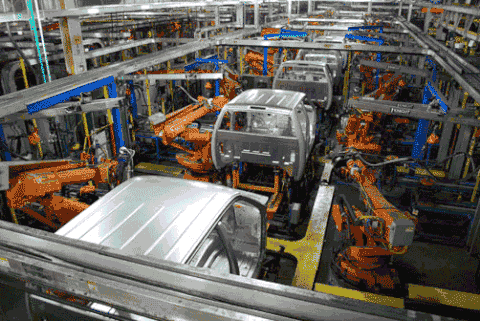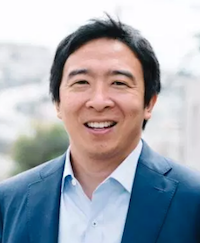
12/11/2018
It’s disappointing that nobody in official Washington is paying attention to the threat of automation to the human workforce and existing economy. After all, the predictions from experts about the automated future are daunting — remember the worst unemployment rate during the Great Depression was 25 percent, but far worse is forecast for coming decades.

Ominous predictions have been accumulating. Oxford researchers forecast in 2013 that nearly half of American jobs were vulnerable to machine or software replacement within 20 years. Rice University computer scientist Moshe Vardi believes that in 30 years humans will become largely obsolete, and world joblessness will reach 50 percent. The Gartner tech advising company believes that one-third of jobs will be done by machines by 2025. The consultancy firm PwC published a report last year that forecast robots could take 38 percent of US jobs by 2030. Last November the McKinsey Global Institute reported that automation “could displace up to 800 million workers — 30 percent of the global workforce — by 2030.” Forrester Research estimates that robots and artificial intelligence could eliminate nearly 25 million jobs in the United States over the next decade, but it should create nearly 15 million positions, resulting in a loss of 10 million US jobs.

It’s refreshing to hear a tech-wise Silicon Valley guy speak up about the threat in a political sense. In a February article in The New York Times (His 2020 Campaign Message: The Robots Are Coming), Andrew Yang (pictured at right) observed, “All you need is self-driving cars to destabilize society … That one innovation will be enough to create riots in the street. And we’re about to do the same thing to retail workers, call center workers, fast-food workers, insurance companies, accounting firms.”
Earlier this year, Yang’s book “The War on Normal People” was published. The Introduction includes a discussion with an automation executive who works to replace call center workers: “We are getting better and better at things that will make large numbers of workers extraneous. And we will succeed. There needs to be a dramatic reskilling of the workforce, but that’s not going to be practical for a lot of people. It’s impossible to avoid a lost generation of workers.”
So it’s unwise to America to continue low-skilled immigration, like the thousands of Central American caravansters who enter as asylum seekers but never show up for their hearings. Most jobs they could handle will be performed by machines in a few years.
Here’s a recent interview with Andrew Yang:
Universal income vs. the robots: Meet the presidential candidate fighting automation, MIT Technology Review, By Erin Winick, December 7, 2018
Andrew Yang announced he is vying for the 2020 Democratic presidential nomination back in February. His mission? Preparing America for automation.
But how is he going to do that? I got the chance to sit down with him at the Work Awesome conference in New York yesterday to ask him about his stances on trucking automation, AI policy, and his favorite topic, universal basic income (UBI).
ERIN WINICK: Why focus on automation and UBI? They aren’t common topics for presidential candidates.
ANDREW YANG: The reason why I’m focused on this issue is I’m convinced it’s driving the social, economic, and political dysfunction we are seeing. The reason why Donald Trump is our president today is we automated away 4 million manufacturing jobs in Michigan, Ohio, Pennsylvania, Wisconsin, Missouri, and Iowa, all the swing states he needed to win and did win. And everyone who works in technology knows full well we are about to do the same to millions of retail workers, call center workers, fast food workers, truck drivers, and on and on throughout the economy.
For me, there was no choice in the matter. It wasn’t like, “I’m going to run for president and I’m going to decide which issue to focus on.” I’m running for president because I know that we’re in the third inning of the greatest economic transformation of industry in the world and that our politicians don’t understand it all.
Do you view automation as something that is bringing primarily negative change to the US?
I tend to focus on truck driving because it’s something people understand. We should be celebrating the possible automation of truck driving as a job, because it would save thousands of lives — about 4,000 Americans die in accidents due to truckers every year.
But on the flip side, you have 3.5 million Americans who drive trucks for a living. Yes, it will potentially cause riots and mass strife, especially when you consider there are an additional 5 million Americans who work at truck stops, motels, and diners who rely on the trucks stopping. So it’s overly simplistic to say is automation a good thing or is automation a bad thing. My mission as president is to make it as good a thing as it can be for as many people as possible.
What is the time frame you see for these changes to the trucking industry? Because there’s a shortage of workers in trucking right now, and some think these technologies could help solve this shortage.
There are massive trucker shortages. It’s a very difficult, turnover-prone job because it’s a very hard job on your body. That’s actually going to hasten the automation of the job, because they say, “It looks like we are missing half a million people, so let’s get to automating this.”
The time frame you are looking at, the experts tell me, is five to 10 years away. We will see a hybrid model at first. To start, you are going to have a human driver in one truck and a robot truck following. But before long you will see mini convoys, and the human beings getting into the cab of the truck 15 miles out of a densely populated urban area. (Continues)
This is a content archive of VDARE.com, which Letitia James forced off of the Internet using lawfare.